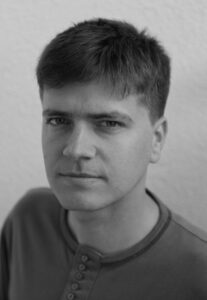How did you come up with the idea for “Tramway”?
During the preparations for my first movie called “The Stop”, while I was walking through Grudziądz (as the plot of both films is set there), I spotted a tram waiting at the stop in the town square.
Two of its carriages were connected, and through the rift between them you could’ve seen only a little piece of the world. It’s nothing unusual, but this situation inspired my artistic process. The tram veiled almost the whole world… At that moment, I came up with an idea to use the vehicle as a metaphor for the character’s life.
How did you start working on the movie?
First, I have finished the production of “The Stop” and I took it on a little festival journey. In the meantime, I was working on the script for “Tramway”. We finished shooting the movie in August of 2020. After that, there was a long editing process. The world premiere took place in March of 2022 during the 69th edition of Martovski Belgrade Documentary and Short Film Festival in Serbia. And then, the festival tour has started. The whole festival journey of this film is very long, and it’s still ongoing. So far, the film has made it to the contests on more than twenty international festivals. Moreover, it has been successful at our Polish festivals as well – OKFA in Konin and Opolskie Lamy. The nomination from Marta Kurzak for the Jan Machulski Award was a cherry on top of it all. The movie was awarded at a few festivals, but the jury’s approval isn’t the most important for me. The awards are crucial, but mostly for the movie’s PR.
Why do you choose mostly foreign festivals?
It is them who choose me, I’d say (laugh). Firstly, “Tramway” is a movie that was mostly made far from the Polish mainstream. Abroad no one cares about that, the only thing that matters is the artistic value. Second thing: “Tramway” is significantly different from the standard Polish short films. And finally: in Poland, the tradition of experimental film has never really developed. I don’t want to say that “Tramway” is an experimental film, as it’s definitely closer to the classic cinema than my debut, “The Stop”, but for me, the most important thing is the constant search within the different layers of the movie: in the narration, structure and form. In Poland, people value the story itself way more than the other aspects of the cinematic language, which tend to be swept aside.
So is there a difference in the reception of the movies in Poland and abroad?
Yes. The movies are universal, but sometimes I feel that people from abroad can understand them better.
Is the reception of the audience there more “mature” for the art cinema?
I’ll give you an example. This summer I was at a festival in a small town in the west of Serbia, it was the Basta Fest. “Tramway” was screened on the first day. I was talking to a young playwright. When I sat down after the announcement of my movie, she asked me why I had explained the metaphor of the tramway – for her it was obvious. In Poland it didn’t seem so clear, a lot of times. I don’t know if she was exceptionally shrewd, or maybe there really is a better understanding of the cinema. Such situations happened far more often at foreign festivals, though. Polish audience often interprets the movie solely story-wise, so on a rather shallow level.
The inspirations. Krzysztof Kieślowski created a short movie “Tramway” in 1966. Are there any references?
I know that one – it’s the first short film of Kieślowski. What’s interesting is that it has a pretty similar theme of meeting in a tram to my film. However, it wasn’t an inspiration of mine.
What was it then?
There was a vast range of inspirations. I watch a lot of movies from the 60’s and 50’s. Classics like Bresson, Ozu and Dreyer. As for contemporary productions, I really like Béla Tarr’s movies. Worth mentioning are: ‘Kairat” – the debut film of Darezhan Omirbayev, a Kazakh film director, often called “the Bresson from Almaty”, as well as Pedro Costa’s debut “O Sangue”. I also really appreciate Berlin film school – cold, reserved cinematography, or Yoshishige Yoshida, a representative of the Japanese New Wave, and his “anti-melodramas”. Recently, I’ve been watching the Dardenne brothers’ movies one by one to analyze them. “Rosetta” or “The Son” are very different from my manner of working. As you can see, I have numerous sources of inspiration. I could mention many more artists whom I appreciate and admire.
“Tramway” is black-and-white. Not only in terms of the color, but also regarding the whole aesthetics of the frames. “The Stop” was also in black and white. Are you planning on continuing your artistic path in that form?
Not necessarily. I’m imagining my debut feature film in black and white, indeed. For now, however, I’m considering making my next short film in color. It all depends on the idea for a particular movie. Everything happens for a reason – I want to keep it that way in my works. If something is unnecessary, I delete it. I stay true to the idea that less is more. I’m not a fan of excessive shooting technology unless it has an important artistic value. It’s often used to hide the lack of real cinematic vision and comes off as flashy.
You’ve mentioned that you have a debut feature film in mind. Is the short film only the beginning of your career? Do you want to abandon it at some point in the future?
I haven’t studied film directing. I’ve finished Law Degree at Nicolaus Copernicus University in Toruń and Media Production Degree at Łódź Film School. I’ve never studied anything art-related. And I think that, despite my difficulties in the beginning, it turned out to be an advantage and will become even more beneficial for me in the future. The making of short films is like a training ground to me. Working on those, you can try out some structural, narrative and formal solutions, and just polish your craft in general. The feature film is that 100% mature form of cinema that also requires enough financial resources to be made. This is my goal for the future.

***
Bartosz Reetz – a film director and scriptwriter, finished Media Production Degree at Łódź Film School and Law Degree at Nicolaus Copernicus University in Toruń. In 2018, he debuted with a short film “The Stop”. At the Lublin Film Festival, the audience has an opportunity to see his second film, “Tramway”. It’s a story about a woman – mother, wife and teacher – for whom the tram becomes a place of an emotional breakdown, as well as a metaphor for her life.
